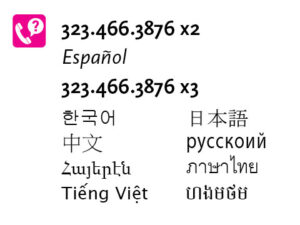Home > About Metro > Fareless System Initiative Task Force (September 2020 – May 2021)
Fareless System Initiative Task Force (September 2020 – May 2021)
Beginning September 2020, the Fareless System Initiative (FSI) Task Force embarked on an intensive process of studying and identifying facts, challenges and opportunities related to eliminating fares on Metro buses and trains.
Overview
Metro is the third busiest transit agency in the nation, serving the largest service area – LA County – with over 10 million residents. In 2019, on average, there were over 1.2 million daily weekday passenger boardings on Metro’s bus and rail system. As a result of the COVID-19 pandemic, ridership has taken a sharp decline. Metro’s ridership has rebounded slightly from its low during the pandemic to just over 700,000 average daily weekday passenger boardings in July 2021.
Metro is working on creative ways to spur economic recovery amidst the COVID-19 pandemic and reverse the trend of declining transit ridership. Metro’s onboard Customer Survey administered in Fall 2019 (pre-COVID) showed that 75% of Metro customers are Latino and African American, with almost 70% of customers having an annual household income less than $35,000 (81% with income less than $40,000). Furthermore, 51% of Metro customers live below the federal poverty level, with a median household income of $19,325 systemwide and only $17,975 for bus riders.
Beginning September 2020, the Fareless System Initiative (FSI) Task Force embarked on an intensive process of studying and identifying facts, challenges and opportunities related to eliminating fares on Metro buses and trains.
The FSI Task Force has collected internal and external feedback through fact-finding and coordination to:
- Evaluate internal processes related to ridership projections, data collection, fare collection, financial considerations, funding opportunities, cost savings and potential labor impacts
- Assess the overall impact to the customer experience, including security, operational capacity and readiness
- Evaluate connections with other agency-wide initiatives
- Assess how a fareless system could support equity in LA County and impact low-income riders
- Convene internal working groups with members of Metro’s senior leadership team and designated staff to evaluate findings
The FSI Task Force also engaged in extensive external stakeholder coordination, including:
- Conducting a countywide survey where over 46,000 responses were received – 86% of current Metro riders and 80% of prospective Metro riders surveyed support free transit
- Convening an ad hoc committee to collect direct feedback and insight from the county’s 26 municipal operators and local transit operators that share Metro’s fare collection system, as well as Access (paratransit) Services and Metrolink, that also serve LA County
Providing updates and incorporating feedback from regional partners, stakeholders, Metro’s Faith Leaders Roundtable, and advisory sub-committees
Update and Next Steps
After studying and evaluating ways to implement a fareless system internally and externally, the FSI Task Force developed several strategic recommendations for the Metro Board of Directors to consider in May 2021. The leading concept includes fareless transit for K-12 students, community college students, and low-income riders. In May 2021, the Board unanimously approved staff recommendations for implementing a pilot initiative, with final approval of a funding plan scheduled for September 23, 2021 The Board has the discretion on the length of the pilot and the decision to terminate the program at the conclusion of the pilot, if long-term Federal/State funding commitments are not secured.
The pilot would begin with free fares for K-12 students and community college students after Board approval in September 2021., The pilot could expand to include low-income riders who meet Metro’s existing low-income qualifications at a future date. The pilot would end in June 2023. The pilot will be carried out on Metro’s buses and trains; in addition, Metro is exploring participation by other transit operators within Los Angeles County.
Metro has conducted a series of public outreach meetings with external stakeholder groups. Metro continues to accept public comment on the overall Fareless System Initiative and the pilot recommendations. The Board of Directors will consider acting on staff recommendations at the Regular Board meeting scheduled on September 23, 2021.
For more information and to submit your written comments, please email: fareless@metro.net .

